Will I Need Another Full-Mouth Reconstruction?
I paid $42k for a full-mouth reconstruction in 2023. My mouth is raw, chewing, hurts, and I have lost several crowns and veneers. I’m afraid that two of the dental implants are failing. How can I start over again? I’m sure I don’t have a choice. Thanks. Kofi from TX
Kofi,
We are sorry that you’re experiencing multiple problems with your full-mouth reconstruction. We know it’s frustrating.
The first step is to find a highly qualified dentist when faced with the need for dental implants and addressing previous cosmetic dental issues. Some dental practices may offer lower costs by taking shortcuts, but this can compromise your treatment. While you don’t have to choose the most expensive dentist, beware of unusually low fees because you may not get comprehensive care, which is essential for full-mouth reconstruction.
Finding a clinician with demonstrable skills in implant procedures and advanced cosmetic dentistry is essential. To identify a dentist who can meet these demanding needs, consider the following factors:
- Verification of Implantology Credentials: Look for dentists with advanced training and earned credentials from reputable implant organizations. A strong indicator of expertise is attaining fellowship or diplomate status from the International Congress of Oral Implantologists or the American Board of Oral Implantology (associated with the American Academy of Implant Dentistry). Training from American university implant programs or the Misch Implant Institute is also a higher level of qualification.
- Commitment to Careful Diagnosis: Pay attention to the thoroughness of the diagnostic process. For example, a dentist planning multiple implant placements should use a 3D CT scan to ensure precise implant placement.
- Assessment of Online Reviews: Check online patient reviews, especially on Google and Yelp, for mentions of clinical issues or positive experiences. Weigh individual reviews carefully because some dentists with limitations might still have enthusiastic supporters. Still, reviews are critical in choosing a dentist for full-mouth reconstruction.
Finding a Dentist Who Produces Cosmetic Excellence
The success of your treatment requires functional implants and beautifully crafted and durable crowns or porcelain veneers. Beyond the technical aspects of implant placement, your dental history requires an advanced cosmetic dentist who can correct your full-mouth rehabilitation and help you smile comfortably and confidently.
Dr. Thaddeus Michalski, a Rocky Hill, Connecticut dentist and Diplomate of the International Congress of Oral Implantologists, sponsors this post. Read how he strives to provide some of the best dental care in Rocky Hill.
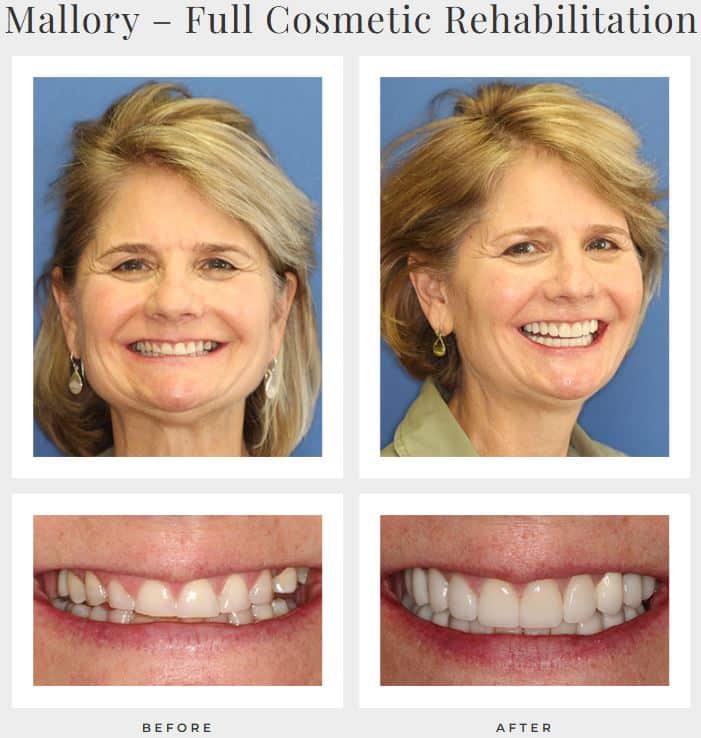
I Regret Bypassing My Dentist and Going to the Lab for a New Partial Denture
I made the mistake of going directly to the lab for a new partial denture. I bypassed my dentist to save money. I have coworkers who use the same lab and have no problems. My partial denture is uncomfortable and too short. It rocks when I chew. The lab couldn’t fix it and told me I need my dentist’s impressions to fix it. Why would they agree to do it? I’m embarrassed. What should I do? Thanks. Karl from SC
Karl,
We understand that dealing with a partial denture that moves when you chew must be frustrating and uncomfortable. A secure and comfortable fit is essential for any dental appliance to function correctly and feel natural.
Creating a partial denture that fits precisely involves crucial steps a qualified dentist takes. Your dentist takes accurate impressions of your mouth and makes a detailed model of your teeth and gums. They use this information to design the denture and write a specific prescription, which they then send to a dental laboratory. A dentist’s guidelines ensure the lab technicians have the exact specifications to craft an appliance tailored to your unique oral anatomy.
Legally, dental laboratories in the United States cannot create partial dentures, complete dentures, or any other dental restoration directly for a patient without receiving a prescription from a licensed dentist. While you may have approached the lab directly to save money, the lab operates under these legal requirements and should have declined to make the denture without a dentist’s order. Because the lab professionals know these rules, the primary fault lies with them for proceeding without the necessary prescription and dental guidance. Lab technicians are skilled in fabricating appliances but do not take dental impressions or design restorations directly in a patient’s mouth; this expertise belongs to the dentist. Skipping the dentist’s essential diagnostic and design work leads to an inaccurate fit and the type of movement you are experiencing.
If you want a refund from the laboratory, you can inform them that making the appliance without a dentist’s prescription is illegal. Mention that you are prepared to report this violation to the state dental board. They will likely agree to refund your payment to avoid formal action.
After addressing the issue with the lab, we strongly encourage you to consult with your dentist or find a new dentist you feel comfortable with. They can take precise impressions and oversee the creation of a new partial denture that will fit correctly, feel comfortable, and remain stable when you chew.
What Is an Alternative to a Partial Denture?

As you think about replacing the ill-fitting partial denture, you may also want to learn about dental implants as an alternative solution for missing teeth. A dental implant is a small, artificial root (usually made of titanium) that a dentist surgically places into your jawbone, which integrates to support a replacement tooth.
Dental implants offer several advantages over partial dentures, which are worth considering, especially when it’s time for a replacement. Understanding these benefits can help you make an informed decision about your long-term dental health:
- Durability: Dental implants can last 20 years or significantly longer with proper care, while partial dentures generally require replacement every five to seven years.
- Self-Sufficiency: An implant supports a dental crown (the visible part of the replacement tooth) without relying on adjacent natural teeth for support, unlike partial dentures, which often use clasps on neighboring teeth.
- Stability: Because the implant fuses directly with your jawbone, it provides a very stable foundation that does not move or shift when you chew or speak.
- Bone Preservation: Implants stimulate the jawbone like natural tooth roots, helping maintain bone density over time.
If you want a more permanent and stable tooth replacement option, consider discussing dental implants with a dentist with implantology experience. They can evaluate your needs and oral health to determine if you could benefit from this advanced treatment.
Dr. Thaddeus Michalski, a Rocky Hill, Connecticut dentist and Diplomate of the International Congress of Oral Implantologists, sponsors this post.
Do I Need a CT Scan to Get a Dental Implant?
Do I need a CT scan to replace a front left missing tooth with a dental implant? I’m trying to avoid unnecessary xrays. Also, I had three consultations, and one dentist uses Southern Venturi dental implants, which I have not found on the list of best dental implants. I’m inclined to remove the dentist from my list of providers. Are Southern Venturi implants safe? – Thank you. Kasen
Kasen,
We understand your desire to minimize radiation exposure.
Do You Need a CT Scan to Get a Dental Implant?
A CT scan provides invaluable three-dimensional information about bone density and structure, essential for accurate implant positioning. Many dentists skip CT scans for implant placement and use traditional X-rays. However, placing an implant without a CT scan, especially in the front tooth area where the nasal sinus is close, can lead to complications such as implant penetration or the need for shorter, less stable implants.
Which Dental Implant Brands Should You Choose?
When selecting an implant brand, the focus should be on quality control and manufacturing precision. While finding replacement parts or adjusting is a concern, the primary goal is to prevent implant failure.
We recommend avoiding lesser-known brands like Southern Venturi. Leading implant manufacturers known for their high-quality products include Straumann, Nobel Biocare, 3i, BioHorizons, Zimmer, and Astrotech. Some experts have reservations about Bicon implants.
It is crucial to choose an implant dentist who prioritizes implant quality and is knowledgeable about the options. A cheaper implant brand can compromise the long-term success of the procedure.
Look for an implant dentist with credentials (fellowship, diplomate status, or accreditation) from the International Congress of Oral Implantologists or the American Board of Oral Implantology.
Dr. Thaddeus Michalski, a Rocky Hill, Connecticut dentist and Diplomate of the International Congress of Oral Implantologists, sponsors this post. Find out what Dr. Michalski does to provide some of the best dental care in Rocky Hill.
Is It Too Late for Dental Implants If I’ve Worn Dentures for 17 Years?
Is it too late for dental implants if I’ve worn dentures for 17 years? What can I expect from the procedure? Thanks. Lucas
Lucas,
Wearing dentures for years will not prevent you from getting implant dentures.
Can You Get Dentures After Wearing Dental Implants for Years?
You can get dental implants after wearing dentures for decades. However, the longer you wear dentures, the more complex your dental implant procedure will become. When all your teeth are missing, they can no longer stimulate and preserve your jawbone. As the jawbone shrinks, your facial muscles will begin to sag.
Getting dental implants often requires bone grafting procedures to ensure they have enough support. Your dentist or oral surgeon may use bone harvested from your body, such as the hip, or the dentist may recommend donor, bovine, or artificial bone.
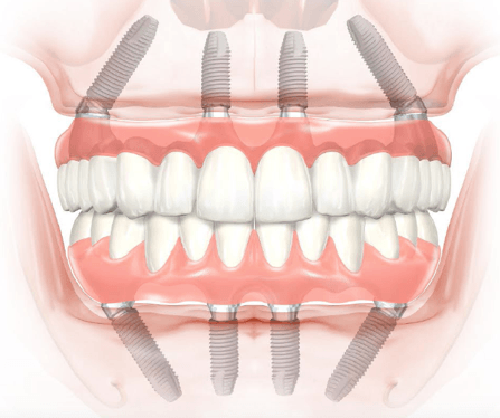
The All-on-4 or All-on-6 procedure is an alternative to bone grafting. The procedure angles the rear implants in the jawbone to help prevent displacement.
We recommend consulting a skilled implant dentist with post-graduate training in implantology. Otherwise, a dentist with implant denture experience can refer you to an oral surgeon. Ensure that you visit the dentist before the oral surgeon. They can coordinate your care so the dentist provides dentures that fit your mouth and bite. The surgeon will use a surgical guide to place the implants based on the dentist’s plans for your denture placement. After an exam and CT scan, the surgeon will explain your implants and bone grafting options.
Your implant dentures will be stable and look and feel more like natural teeth.
Rocky Hill, CT, dentist Dr. Thaddeus Michalski sponsors this post.
Why Do My New Dental Crowns Still Hurt?
In September, I had two upper left crowns replaced. I wore temporary crowns for almost four weeks while waiting for the final one. As I wore the temporary crowns, they started to smell, leave a bitter taste in my mouth, and become painful. My dentist said that the new crowns would resolve the issues. The pain increased after I received my final crowns. When I returned to the dentist, he said my bite was probably off. He drilled to correct my bite, but now that pain comes and goes. It hurts to chew and bite down on the left side of my mouth. I am afraid that I have tooth infections and will need dental implants if I continue to let my dentist experiment on my teeth. What can I do? Thanks. Oakley
Oakley,
Almost four weeks is a long time to wear temporary crowns. We understand that your experience is frustrating. Although you need an exam and X-ray to determine the cause of your discomfort, we will discuss some causes of problems with temporary and permanent crowns.
Pain and Odor with Temporary Crowns
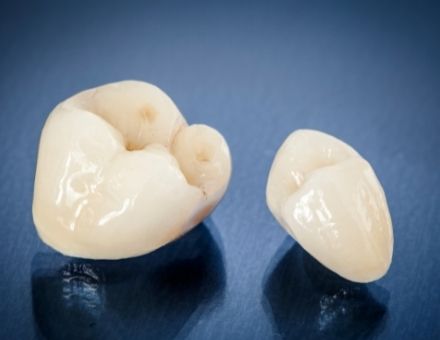
If your temporary crowns begin to smell and hurt, microscopic particles are trapped between the crowns and your teeth and breed bacteria. The bacteria affect the dentin (the layer beneath tooth enamel) and irritate it. The tooth beneath a crown can begin to decay.
Why Do Your New Dental Crowns Hurt?
Dental cement that bonds a new crown can irritate your tooth. If a tooth is already sensitive, the sensitivity may temporarily increase but gradually decrease and go away. When sensitivity does not improve, the tooth may be infected. Your dentist might need to perform root canal treatment on the tooth.
Pain When Biting with a New Crown
If you feel pain when biting or chewing with a new crown, your dentist should adjust your bite until you are comfortable. Even tooth ligaments are sometimes irritated, and your dentist would need to x-ray the roots to see their condition.
If your dentist cannot resolve sensitivity with your new crowns, we recommend that you get a second opinion to prevent the need for dental implants.
Rocky Hill, Connecticut, cosmetic dentist Dr. Thaddeus Michalski sponsors this post.
Do I Need a Tooth Root Removed That Broke During Extraction?
When my dentist removed my upper left first molar, part of the tooth root broke off. My dentist referred me to an oral surgeon to remove the root. Is there any harm in leaving the root in the socket? How common is this, anyway? I’m a little frustrated that my dentist could have referred me to a surgeon in the first place. He wounded so confident about the extraction that I trusted him. Thanks. Leander from S. Dakota
Leander,
Part of a tooth root may break during tooth removal because of the root shape or challenges removing the tooth; it is not uncommon. If a dentist realizes a root fragment is left, they may refer you to a specialist. Other dentists use an X-ray to anticipate the complexities of extraction and may refer you to a specialist upfront for tooth removal.
Do You Need to Remove a First Molar Tooth Root?
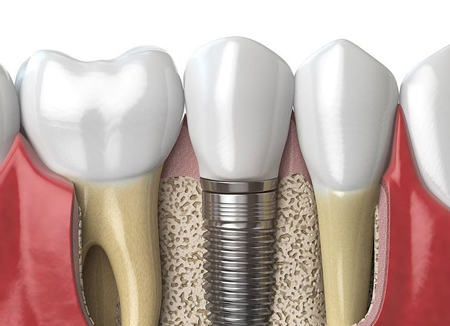
If a dentist leaves a tooth root behind after extracting an upper first molar tooth, the root can poke the sinus, resulting in sinus perforation. Leaving the tooth root in the socket for months increases complications and risks. Sinus perforation surgery can be complex and requires the skill of a specialist.
We recommend getting a second opinion right away. If the tooth root is too close to the sinus wall, a specialist may decide to leave it. Otherwise, the surgeon will remove it promptly.
If you are considering a dental implant to replace the missing first molar tooth, talk to the surgeon about it. Depending on the condition of the tooth socket and your sinus, the surgeon may recommend a bone graft or sinus augmentation procedure to prepare the site for an implant. A dental implant needs enough quality bone to support an implant crown. Caring for the socket now can prevent the need for another surgery later if appropriate. Ask the specialist about your options.
Dr. Thaddeus Michalski, a Rocky Hill, Connecticut dentist and Diplomate of the International Congress of Oral Implantologist, sponsors this post.
My Dentist Wants to Remove My New Implant
I chose the wrong dentist for implants because he placed them in shallow bone and now wants to remove them. A month after implant surgery, my dentist took an x-ray and said the implant he not healing. He wasn’t to remove it and try again. So far, the implant is not loose and doesn’t hurt. I do not trust the dentist to try again. Two weeks ago, I told the dentist I needed time to consider my options. I don’t believe I have options other than implant removal, but I need advice. What do you suggest? Thank you. Wilfredo from Elk Grove, CA
Wilfredo,
Thank your question. We understand that dental implant failure can be frustrating and disappointing. Dr. Michalski would need to examine your implant site for an accurate diagnosis, but we can provide some helpful Information.
What If Your Dentist Wants to Remove Your Implant?
If your dentist wants to remove your implant after placing it in shallow bone, it probably means that the dentist did not plan properly. Skilled implant dentists take a 3-D CT scan before implant placement to see your bone volume and determine whether it is enough for implants or if you need bone grafting.
Your dentist is responsible for these reasons:
- Low-quality standard of care
- Increasing your risk of infection or trauma
- Performing surgery that would fail
- Creating an inconvenience for you to repeat surgery
What Can You Do If About Dental Implant Failure?
You should request a refund if a dentist’s negligence causes dental implant failure. If the dentist is uncooperative, you can try the following:
- Report the issue to the state dental board
- Get advice from a medical malpractice attorney
- Get a second opinion from an advanced implant dentist
Is It Too Late to Replace a Dental Implant?
Usually, it is not too late to replace a dental implant that failed due to a lack of bone volume. A skilled implant dentist can determine whether a bone graft will help you continue treatment. The dentist must take the following steps:

- Remove the loose implant
- Perform bone grafting surgery
- Allow the graft to heal, or in some cases, immediately place the new implant
We wish you a smooth resolution.
Dr. Thaddeus Michalski, a Rocky Hill, Connecticut dentist and Diplomate of the International Congress of Oral Implantologist, sponsors this post.
Can a Dentist Save My Tooth Without a Post and Core?
I expected my dentist to tell me I needed a root canal, but he also mentioned adding a post and core. I did not fully understand her explanation about why I needed the post and score. It seemed that she was repeating something she had read in a textbook. I am anxious about a root canal, but a post and core sound like a long appointment. When are a post and care necessary? Thank you. Noah from Detroit, MI
Noah,
Thank you for your question. Dr. Michalski would need to examine and x-ray your tooth for an accurate diagnosis, but we will explain the purpose of a post and core, when it is required, and how it affects the long-term outcome of a tooth.
What Are a Dental Post and Core?
A dental post and core are materials to strengthen a tooth weakened by decay, damage, and root canal treatment. The post is a small cylinder that supports a core. The core is a dental filling material that replaces the tooth pulp and supports a dental crown.
Why Would a Dentist Recommend a Post and Core?
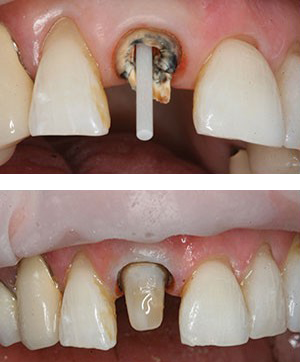
A dentist may recommend a post and core so that your tooth can support a dental crown. Sometimes, preparing your tooth for a crown requires a dentist to remove a lot of decay or damage, leaving a small amount of tooth structure. The core, or dental filling material, will replace the tooth structure and allow a dentist to cement a crown on the tooth.
The process includes these steps:
- Complete root canal therapy to remove tooth decay and infection
- Place one or two posts into the tooth
- Fill the tooth with dental material
- Build up and shape the tooth with dental bonding
- Bond a dental crown to the tooth
Will You Lose Your Tooth Without a Post and Core?
Declining a post and core may result in tooth loss for these reasons:
- You may not have enough tooth structure to support a dental crown.
- Your tooth can become weak and brittle.
- Without a post and core, you may need an extraction and dental implant
Please keep in mind that if you lose the tooth, replacing it with a dental implant and crown can cost $3,000 to $5,000 depending on these factors:
- Condition of surrounding gums and bones
- Procedures you may need in preparation for an implant
- Dental fees in your location in the U.S.
If you are unsure about your dentist’s recommendation for a post and core, schedule a second opinion with an advanced cosmetic dentist trained in root canal therapy and dental implants.
Dr. Thaddeus Michalski, a Rocky Hill, Connecticut dentist and Diplomate of the International Congress of Oral Implantologist, sponsors this post.
What Are the Types of Bone Grafting for Dental Implants?
Successful dental implant placement requires sufficient jawbone volume because your bone is the foundation for dental implants. When a tooth is missing, your body resorbs the surrounding bone and uses the minerals elsewhere in the body. If you have experienced jawbone shrinkage, you may need bone grafting to build up the bone before you get dental implants.
What Are the Types of Dental Implant Bone Grafting?
Types of bone grafting for dental implants include your bone, tissue-bank human bone, animal bone, mineral bone, and synthetic bone manufactured from proteins in the body.

- Your bone (autograft) – Your chin, hip, jaw, or tibia can be a source of bone for grafting into your jawbone. Harvesting bone from another site requires surgery. Some implant dentists or oral surgeons harvest tibia bone in the office while you are under IV sedation. Harvesting bone from your hip requires hospitalization. Autografts are the most effective bone grafting because your body adapts quickly.
- Tissue bank human bone (allograft) – Reputable tissue banks supply human cadaver bone. Tissue bank grafting is less expensive than autograft. Although tissue banks screen donors, you will have the risk of infection from donor tissue, as with a blood transfusion.
- Animal bone (xenograft) – Sterilized animal bone—most often from a cow—minimizes the risk of infection. Your body absorbs the bone over time and replaces it with your bone.
- Mineral bone substitute (alloplast) – Next to bone harvested from your body, synthetic bone is the safest means of grafting. Your body will eventually absorb and replace the bone with your bone tissue.
- Recombinant gene technology-derived protein – Proteins naturally found in the body are used to manufacture bone synthetically. The protein is FDA approved as an alternative to an autograft.
How Long Is Dental Implant Bone Graft Healing Time?
The bone grafting healing period can take four to nine months, depending on the graft used and how your body reacts to it. After it heals, your dentist or oral surgeon will perform dental implant surgery. In some cases, such as with tooth extractions, you may receive bone grafting and implants on the same day. Your implant dentist will explain your options for bone grafting and the outcome you can expect.
Rocky Hill, Connecticut dentist Dr. Thaddeus Michalski, sponsors this post.
How Can I Find Affordable Implants for My Pop-Up Denture?
I got a bum pop-up denture from a dental school. I won’t say which school it came from, but now I know I should never have gone the cheap route. The bottom denture pops up whenever I move my tongue, yawn, or cough. I press it back down, and it pops up again. I want to be furious, but I am disappointed with myself for choosing the school. I don’t have much money, but neither am I broke. A friend recommended his dentist, but I chose the dental school figuring the instructors were supervising and I could get a good deal. Now I need affordable implants to hold the denture down. Where do I start? – Thomas from NJ
Thomas – Thank you for your question. We are glad that you are seeking professional advice before getting dental implants. Please begin by avoiding looking for a bargain or the cheapest implants.
How Can You Get Affordable Implants for an Existing Denture?
You may find affordable implants for an existing denture by scheduling a consultation with a skilled implant dentist. The dentist will examine your denture to determine why it lifts and whether the dentist can fit it for implants. Depending on the condition and quality of your denture, a dentist may be able to refit it, or you may need a new denture.
Qualifying for dental implants
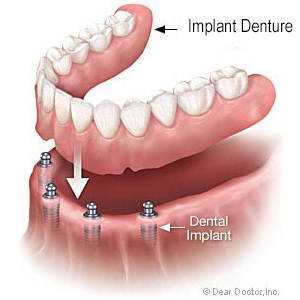
Getting Dental Implants that Fit Your Denture
After implant surgery, you will wear temporary replacement teeth. In three to four months, your jawbone and implants will fuse. Your implant dentist will take impressions of your mouth to ensure your existing or new denture fits your implants securely.
Expect to pay well for high-quality dentures and implants. Thorough, well-planned implant-supported dentures take time and skill. With patience and a good implant dentist, your frustration will change to satisfaction when you receive a stable, natural-looking smile.
Schedule a consultation with one or two advanced implant dentists to discuss your options and how to make treatment affordable.
Dr. Thaddeus Michalski, a Rocky Hill, Connecticut dentist and Diplomate of the International Congress of Oral Implantologist, sponsors this post.


